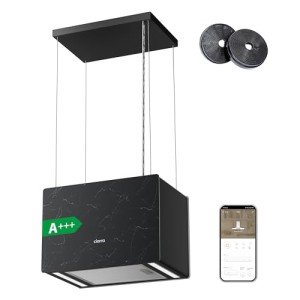10 Things That Your Family Taught You About Extractor Fan For Island HвА¶
л≥ЄлђЄ

The Essential Guide to Extractor Fans for Island Hobs
In contemporary kitchens, the island hob has become a standout feature, acting as a focal point for culinary imagination and celebrations. Nevertheless, with the arrival of open-plan home, the requirement for effective ventilation becomes vital. An extractor fan for an island extractor hoods hob is not simply a luxury; it's a necessity. This article will look into the reasons you ought to think about installing an extractor fan, the types offered, their features, and the best practices for setup and upkeep.

Why Install an Extractor Fan for Island Hobs?
Island hobs are frequently located away from walls, making standard overhead extraction hoods not practical. Here are some crucial reasons that an extractor fan is vital for island kitchen extractor hobs:
Air Quality Improvement: Cooking generates smoke, steam, and odors. An extractor fan efficiently removes these pollutants, resulting in a cleaner kitchen atmosphere.
Heat Reduction: Extractor fans help expel hot air, adding to a more comfy cooking environment.
Security Against Grease Build-Up: Continuous exposure to cooking fumes can lead to grease accumulation on surface areas. An extractor fan reduces this danger.
Visual Appeal: Many modern extractor fans are designed to match kitchen visual appeals, ending up being elegant additions rather than eyesores.
Types of Extractor Fans
When picking an extractor fan for an island hob, it's essential to consider the various types readily available on the marketplace. Here are the most common:
| Type | Description | Pros | Cons |
|---|---|---|---|
| Ducted | These systems vent air outside via a duct. | Highly effective at eliminating odors and smoke; improves air quality. | Installation can be complex; requires a course to exterior. |
| Ductless (Recirculating) | Filters air and island hob recirculates it back into the kitchen. | Easier to install; no external vent needed. | Less effective in getting rid of smoke and smells; needs frequent filter changes. |
| Downdraft | Retractable system placed behind the hob. | Discreet design; efficient for island settings. | Relatively costly; may not be as powerful as traditional hoods. |
| Wall-mounted | Comparable to conventional hoods but designed to hang over islands. | Efficient and available in different styles. | Requires sufficient space; can block views. |
Key Features to Consider
When purchasing an extractor fan for an island chimney hood hob, there are several functions to bear in mind to guarantee optimum efficiency and fulfillment:
Suction Power: Measured in cubic meters per hour (m THREE/ h), this indicates how successfully the fan can get rid of air. A greater rating is usually preferred for effective ventilation, especially in big, open spaces.
Sound Level: Measured in decibels (dBA), quieter models are more effective for comfort, specifically in open-plan designs.
Filter Quality: Ensure the fan is equipped with top quality filters (e.g., triggered carbon filters for ductless models) that can be easily replaced.
Control Options: Look for fans with instinctive controls such as touchscreens, push-button controls, or wise features that allow for seamless operation.
Energy Efficiency: Opt for energy-rated designs to minimize energy usage and long-lasting expenses.
Installation Best Practices
Setting up an extractor fan requires careful planning to maximize its effectiveness. Here are some essential pointers:
Positioning: Mount the fan 65-75 cm above the cooking surface area for ideal performance.
Sufficient Ducting: If picking a ducted fan, make sure that ducting is kept straight and as short as possible to lessen airflow resistance.
Electrical Work: Hire a certified electrical contractor to ensure that all electrical connections abide by safety standards.
Follow Manufacturer Guidelines: Adhere strictly to the setup directions supplied by the manufacturer to ensure safety and performance.
Professional Installation: Where necessary, consult professional installers for complex systems, especially those needing duct.
Upkeep Tips
To make sure long-lasting performance from your extractor fan, regular upkeep is important. Consider the following tips:
Clean Filters: Depending on usage, clean or change filters regular monthly for ideal air quality.
Examine Ducts: Regularly check ductwork for any blockages or damage and tidy as required.
Fend Off Grease Buildup: Periodically wipe down surfaces to avoid grease accumulation.
Utilize a Soft Cloth: For regular cleaning, Island hob utilize a damp cloth and moderate detergent, avoiding abrasive materials.
Frequently asked questions
1. How do I choose the right size extractor fan?
Determine the required airflow utilizing the space size. Calculate it based on the kitchen's volume (length √Ч width √Ч height) and increase by 10 to 15 air changes per hour.
2. Are ductless extractor fans reliable?
While ductless fans are easier to install, they are less reliable compared to ducted systems. They can purify the air but might permit some smells to stick around.
3. Can I install an extractor fan myself?
It is advisable to seek professional assistance for installation, particularly for ducted fans, as incorrect setup can lead to decreased efficiency and security hazards.
4. How typically should I replace extractor fan filters?
For ideal performance, replace or tidy filters every 1-3 months, depending on cooking frequency and the type of filter.
5. Do extractor fans consume a great deal of electrical power?
Modern extractor fans are created to be energy-efficient. Inspect the energy ranking before purchase to select a more affordable alternative.
An extractor fan for an island cooker hood hob not only improves cooking experiences however also safeguards indoor air quality, contributing to a more pleasurable kitchen environment. By considering the types offered, essential functions, and appropriate installation and upkeep, homeowners can make informed decisions that match their needs. With the right extractor fan, cooking can be an enjoyable and healthy pastime, free from concerns about air quality and convenience.

лМУкЄАл™©л°Э0
лМУкЄА нПђмЭЄнКЄ мХИлВі